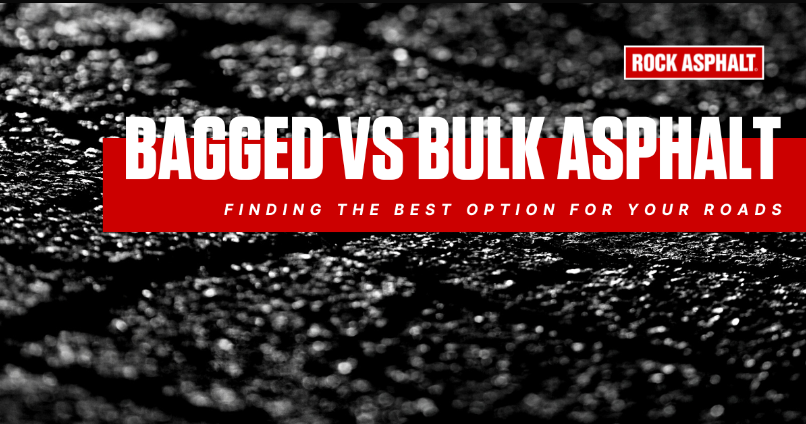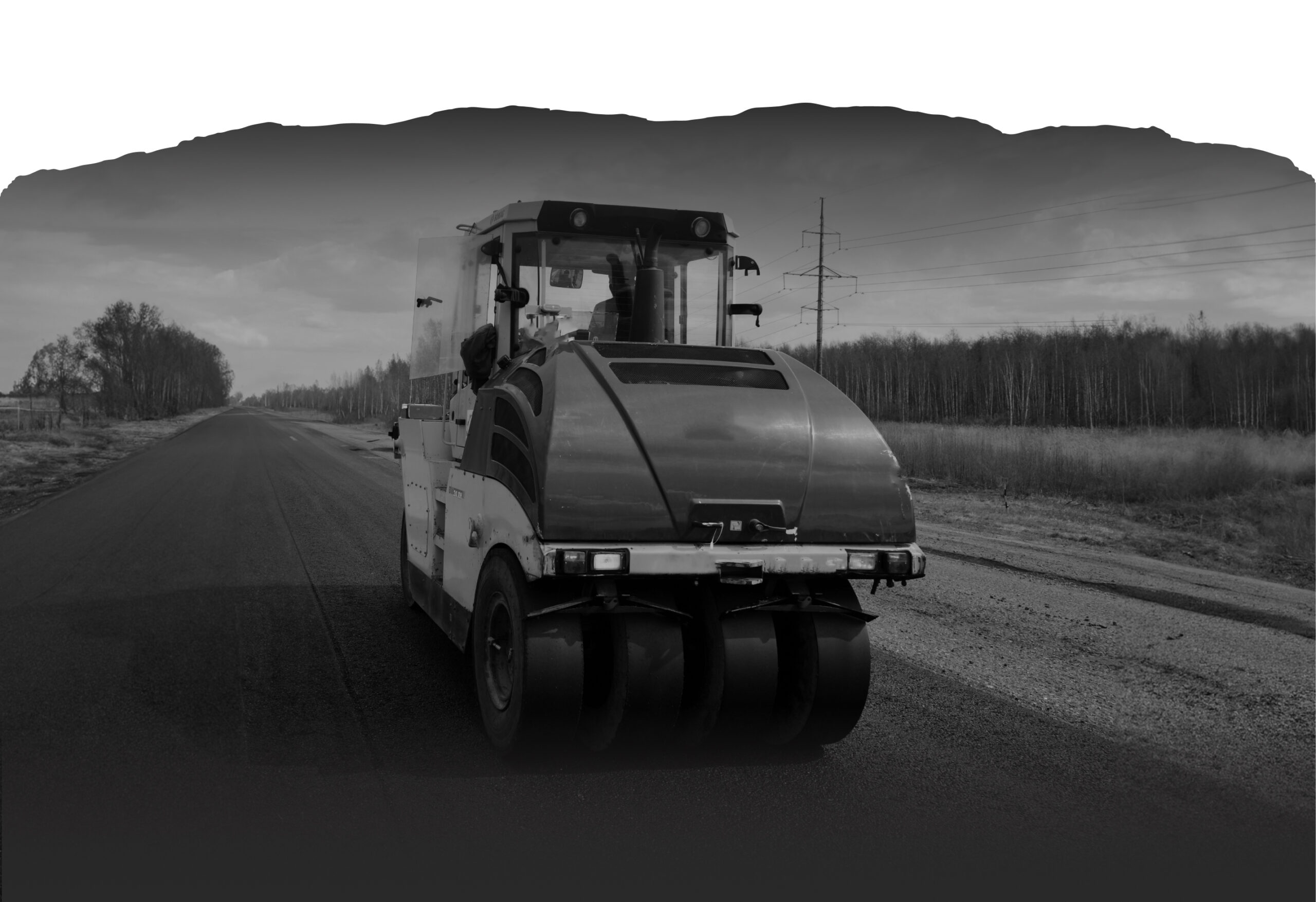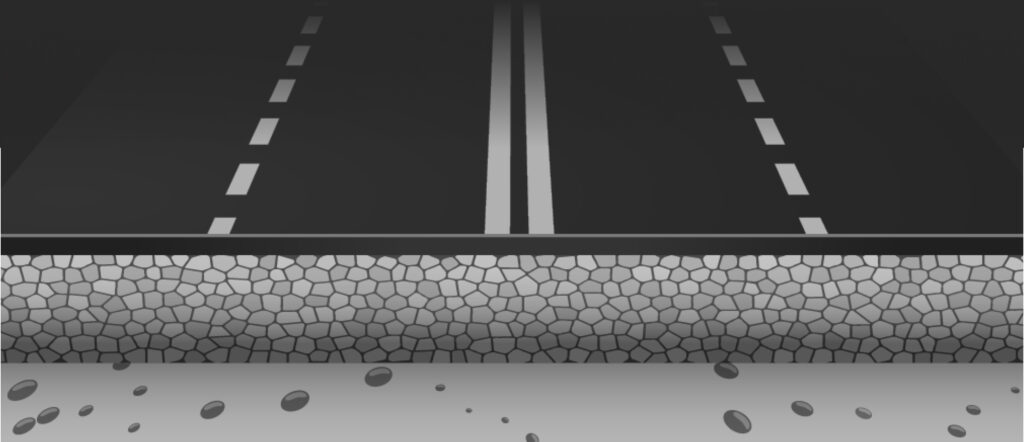Bagged Asphalt vs Bulk Asphalt: How to Choose What’s Best for You

Road repairs aren’t one size fits all. The amount of asphalt you use isn’t either. Depending on the size of your project, 100-150lbs of bagged asphalt will be enough, or a few bulk truck loads, or something in between.
The size of your project dictates how much material you purchase, but there are benefits and downfalls for either option. Are you wasting budget on expensive bags that only offer a temporary patch or are you left with tons of unusable material from buying bulk? Is the amount you’re buying the wrong amount, or just the wrong product?
Bulk Asphalt
If a product is purchased in bulk it’s usually because there’s a large need for the product, or you’re able to buy that product at a discounted price. The obvious purchase for larger road maintenance projects such as new road construction and extensive pothole repairs is bulk asphalt, but buying bulk doesn’t always mean buying better, or cheaper.
Bulk Hot Mix Asphalt
Although hot mix asphalt is cheap in terms of material, the costs of acquiring and paving the material add up. Heavy machinery, long wait times at the plant, weather restraints, and large purchase minimums all factor into the hidden costs of paving with hot mix asphalt. Most asphalt plants require a minimum purchase amount, regardless of how much material is needed for your project.
Often, road crews experience long wait times at the plant that cut into the actual working hours of road maintenance, extending construction times and increasing budgetary expenses. And because hot mix asphalt must maintain a temperature between 300 – 350 degrees Fahrenheit, keeping the material heated to the required working temperature requires special equipment and extra costs.
A sudden change in the weather, like a thunderstorm, makes hot mix asphalt unusable until the ground is dry enough for the material to create a bond. Large road maintenance repairs are often delayed due to inclement weather. Hot mix asphalt is an excellent choice for road repairs because of its durability and coverage, but the steps for using this material are lengthy, challenging, and often quite costly.
Bulk Cold Patch Asphalt
Another option for buying paving materials in bulk is cold patch asphalt. While this product is often only used for temporary road repairs, it is made to be stockpiled for long term storage and later usage. It’s especially useful in colder temperatures when hot mix asphalt cannot be used.
However, as many cold patch asphalts are covered in a chemical binder, changes in temperature and moisture levels can greatly impact your future road repairs. Ice, water, and dirt dilute the material’s binding agent that greatly affects its performance. Basically, the longer the material is stored, the greater the chance that it becomes unusable.
And because many cold patch asphalts are only rated for temporary road repairs during colder temperatures or times of emergency, most of your repairs will eventually have to be redone with a more permanent material when the weather permits.
Bagged Cold Patch Asphalt
You might not need a ton of material for your road repairs, you might only need a few 50lbs bags of asphalt. This is the case for many organizations who do regular road maintenance. As potholes form, it’s not always realistic or cost effective to continually purchase asphalt in bulk, regardless of whether it is hot or cold.
While more expensive than hot mix asphalt, the cost of installing bagged cold patch asphalt is much lower. Some brands still require the use of heavy machinery, but others only need simple compaction in order to create a pavement patch.
Bagged cold patch asphalt is also sealed from external elements and therefore has a much longer shelf life than buying cold patch in bulk. However, these bags often tear and rip from being moved around on pallets or loaded into work trucks. Because of this, it’s common to pick up a bag of “sealed” cold patch only to find it hardened from a tear that allowed moisture to seep into the material.
Cold patch is widely used as a cheap, fast repair option in cases of emergency or inclement weather, but the hidden costs add up. Torn, unusable bags combined with the temperance of the repairs themselves lend into the long term cost of using this product. The coverage of some cold patch asphalt also factors into the overall price of using this option. While one bag of cold patch might not cost a lot, the amount of bags required to make your repair just might.
What Amount of Asphalt is Best for You?
Deciding between bulk or bagged asphalt is an important decision that every organization tasked with road maintenance carefully researches. What material you buy and how much of it you buy affects your budget, the amount of repairs you can do in a given day, and the overall safety of the repairs you make.
These bagged and bulk asphalt options can lead to unusable materials, temporary patches that fail, and wasted budget. But is it the amount you buy that’s the problem, or is it the material itself?
RockAsphalt©: Your Bulk and Bagged Asphalt Solution
Because of its unique composition, RockAsphalt© is used for road repair projects of all shapes and sizes including permanent pothole repair, utility cuts, new road construction, and more.
Available in 50lbs asphalt bags and 2400lbs sealed Supersacks, our material takes the best of bulk and bagged asphalt options without the common drawbacks of hot and cold mix asphalt.
50lbs Bags of RockAsphalt©
Its all-weather performance allows for making permanent repairs in inclement weather faster and more reliable than cold patch, reducing failed patches that can cause unsafe road conditions. RockAsphalt© took into careful consideration the problem of bagged asphalt tearing and ruining the paving material. Our 50lbs bags of asphalt use a thicker millimeter plastic to ensure your product arrives sealed and ready to be stored until you need it.
Our material is a naturally-occurring limestone impregnated with bitumen that doesn’t drain down or strip and has a shelf-life twice as long as manufactured asphalts.
Bulk RockAsphalt© 2400lbs Supersacks
If 50lbs bags of asphalt aren’t enough and a truck load is too much, we’ve developed a 2400lbs resealable Supersack of RockAsphalt© to ensure your bulk purchase isn’t exposed to the elements. For large road repair projects, our 2400lbs Supersacks keeps your bulk asphalt fresher, cleaner, and more reliable than buying bulk cold patch asphalt.
Unlike hot mix asphalt, RockAsphalt© creates a permanent bond from compaction alone and doesn’t require the need to be heated. Our product is delivered to you when you need it so you no longer have to sacrifice working hours driving to acquire material. Used by TxDOT and other organizations, our material is a cheaper, more weather-resistant option for your large road maintenance projects.
We still recommend that any opened bag of material be used within eight months after opening. To ensure optimal performance, however, we recommend using the repair material within three to six months after being exposed to air.
What Amount of Asphalt Is Right for You?
From bulk to bagged asphalt, RockAsphalt© fits the requirements of your job and your road maintenance process. But it’s not just the amount you buy that matters, it’s the coverage. Our natural asphalt covers up to 76% more square footage than leading cold patch asphalt brands. This means you’re able to use less material to get more road work done.
Road repairs aren’t a one size fits all job, but with RockAsphalt©, it’s a one size fits all repair. As for deciding between bagged and bulk asphalt? That’s entirely dependent on what works best for you and the scope of your project.

Ready to do road repairs the fast & easy way?
RockAsphalt© replaces cold and hot mix making road repair of all sizes fast, clean, simple and permanent the first time.
Try it for yourself and learn why crews love it.
Get your free sample bags and have your team see how fast and easy it is to permanently fix potholes.


